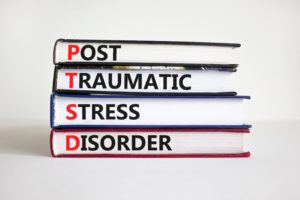
Post-traumatic stress disorder, or otherwise known as PTSD, can affect anyone who has survived a traumatic experience. The symptoms can vary on a person to person basis but some of the most reported symptoms are:
-
Flashbacks
-
Intrusive thoughts or images
-
Nightmares
-
Feeling like nowhere is safe
-
Feeling as if you cannot trust anyone
-
Avoiding feeling or talking about the experience
When the topic of PTSD arises, it’s typically war veterans that people think of. Although they do struggle and experience this at very high rates, other incidents can cause PTSD. Individuals who experience a car accident, being bullied or assaulted, or even surviving a natural disaster can experience symptoms of PTSD. A diagnosis of Complex PTSD may be given when the trauma takes place early in life or if it took place over an extended period of time. C-PTSD can have similar symptoms as PTSD however it can also include:
-
Regular feelings of suicide
-
Difficulty controlling emotions
-
Physical symptoms like headaches, dizziness, and chest pains
-
Feelings of isolation and detach from society
There are many ways to go about treating PTSD including (but definitely not limited to) talk therapy, EMDR, and equine assisted learning. When an individual participates in equine assisted learning (EAL), they are given the opportunity to learn about themselves, their emotions, and work through strong feelings and intrusive thoughts. This is done by pairing individuals with horses to work through a series of activities and conversation prompts. Working with horses can open the door to self-reflection and personal development while maintaining a recovery-focused and forward thinking mindset at the forefront. Because horses are prey animals, they scan their surroundings and reflect their findings. They almost act like a mirror into our emotions. They can sense an increase in heart rate, when the warmth in your body migrates, or if you fidget. These are all symptoms that give the horses insight as to what emotions you’re experiencing and then we receive the non-judgemental and genuine feedback from the animals. It gives individuals with PTSD and C-PTSD a break from ruminating on the past and reliving their experiences and puts them in a position to make changes to improve their present and future self.












 Sharon Walker, MSW, RSW
Sharon Walker, MSW, RSW Jordon Iorio Hons. BA, RSW
Jordon Iorio Hons. BA, RSW Christine Bibby, B.S.W., M.S.W., R.S.W.
Christine Bibby, B.S.W., M.S.W., R.S.W. Brianna Kerr, RSW
Brianna Kerr, RSW Danielle Vanderpost, RSW
Danielle Vanderpost, RSW Daniela Switzer, MA, C.PSYCH
Daniela Switzer, MA, C.PSYCH Tammy Adams
Tammy Adams Jade Bates, RMT
Jade Bates, RMT Caitlin Schneider
Caitlin Schneider Dr. Crysana Copland
Dr. Crysana Copland
 Amy Dougley
Amy Dougley Emily Kamminga
Emily Kamminga Bill Dungey, RSW
Bill Dungey, RSW



 Jessica Moore, RSW
Jessica Moore, RSW Abigail Wragge, RSW
Abigail Wragge, RSW Melanie Clucas
Melanie Clucas Ally Legault
Ally Legault Kunle Ifabiyi
Kunle Ifabiyi Tammy Prince
Tammy Prince
